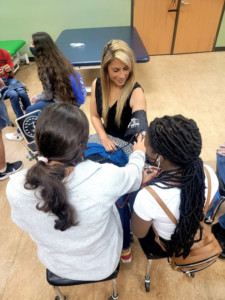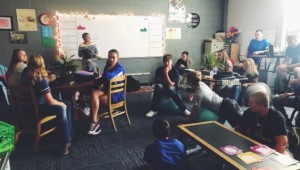15 Learning Predictions for the New Year

As we approach a new year, we always find it fun to look back on the year’s work and see if our predictions came true. From what we see, our predictions for 2017 all panned out and you’ll continue to see more of these in 2018:
1. More Social and Emotional Learning. There will be more emphasis on broader aims including social and emotional learning (SEL). The Aspen Institute’s National Commission on Social-Emotional and Academic Development will advance the conversation and CASEL will expand it’s city and state partnerships (check out this podcast with CASEL chair Tim Shriver).
2. More Project-Based Learning. Given the interest in mindsets, SEL and career readiness, you’ll see more project-based learning (PBL) and all of its more open-ended inquiry-based cousins.
3. More Artificial Intelligence. You’ll continue to see more forms of artificial intelligence (machine learning, deep learning, neural nets) in education including showing up in learning platforms, adaptive math and English software, writing feedback, transportation planning and communication tools. See our recent publication, Ask About AI: The Future of Learning and Work.
4. More Choice. There will be more learning options—not just in terms of schools or courses but, with more personalized learning, in terms of learner experience. In 2018, there will be a few more examples of students earning badges for out of school learning.
5. More Microcredentials. An increasing amount of professional learning comes in small chunks and is demonstrated to colleagues and signified with badges or microcredentials (see Preparing Teachers for a Project-Based World)
6. More Platform Networks. School networks are one of the most important innovations in the modern era of U.S. K-12 education. Like Summit Learning and New Tech Network, these member networks are voluntary associations of schools focused on design principles, tools and supports. All of them benefit from philanthropic contributions, and most of them share a common learning platform.
In 2018 you’ll see:
7. More Updated Grad Profiles: School districts nationwide are updating their learning goals and graduation requirements. The focus is shifting to credits to competencies with more emphasis on work and life-ready skills. (Check out this discussion on Profile of a Graduate with Ken Kay.)
8. More Writing: expanded adoption of writing feedback systems (even Amazon is in the game).
9. More Virtual Reality: the use of VR will double in US schools.
10. More Interoperability: IMS Global and Ed-Fi will make joint progress on combining formative assessment.
11. More Autonomous Transportation: Following UMichigan’s lead, several more universities will adopt autonomous vehicles for on campus shuttles.
12. More Chinese EdTech: There was probably more invested in Chinese EdTech than in the US this year and that trend will continue. Indian EdTech is booming as well.
13. More Microschools:
- Corporate: following WeWork’s lead, several corporations will open microschools on campus
- Urban: two cities will launch microschool networks
- Rural: two states will launch rural microschool networks
14. More Place-based Learning: All the focus on personalized and PBL is leading to stronger community connections and schools leveraging local resources (check out our series on #PlaceBasedEd).
15. More Entrepreneurship Education: Ok, this might be wishful thinking than trendspotting, but we think you’ll see more young people learning how to make their unique contribution by starting a business (see list of current entrepreneurship programs).
What’s on your list for 2018? Tell us in the comments below.
For more see:
- America Succeeds Reports on Education Pathways for the Future of Work
- The Future is Always Uncertain. So How Should Educators Prepare Today’s Learners?
- Closing the Digital Divide to Ensure the Future of Learning
Stay in-the-know with all things EdTech and innovations in learning by signing up to receive the weekly Smart Update.








0 Comments
Leave a Comment
Your email address will not be published. All fields are required.